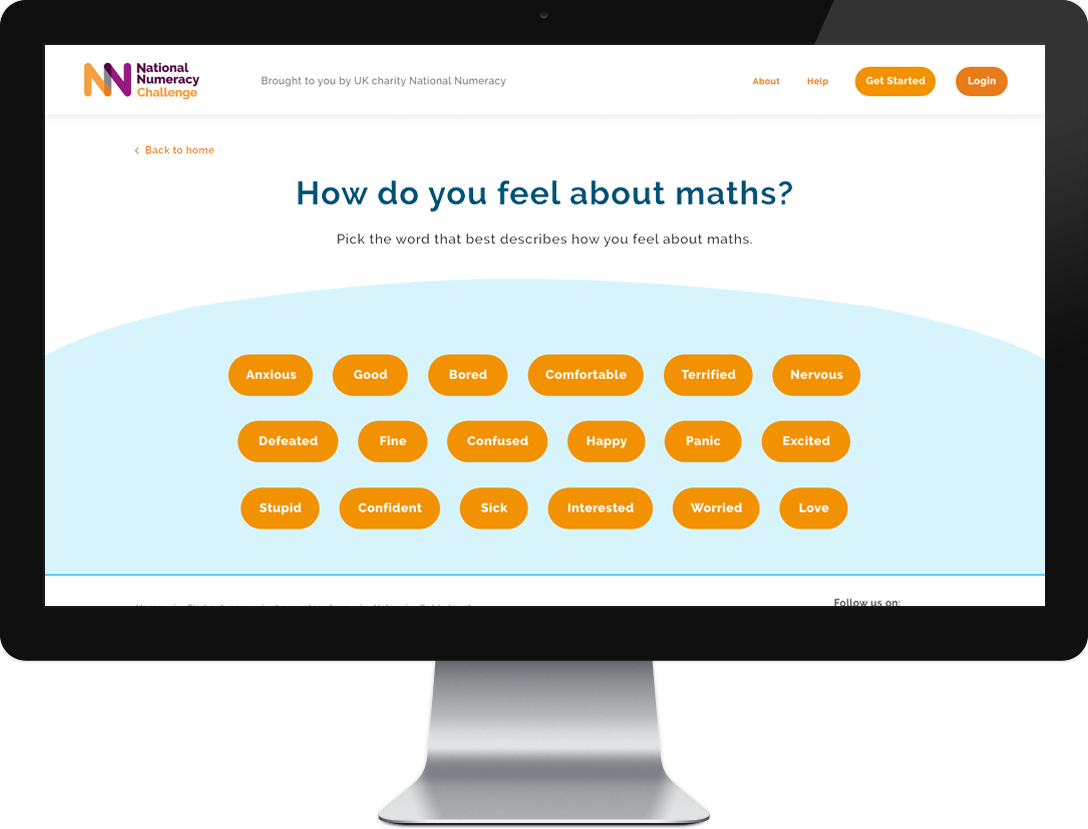Blog
What is meant by an 'anti-maths mindset'?
9 Apr 2024
You may have heard of an ‘anti-maths mindset’ – last year Prime Minister Rishi Sunak spoke about his intent to alter the UK’s anti-maths mindset – but what is it and how does it affect us?
Here we take a look at the meaning of the term, why it is a problem – for you, your kids and the UK – and, crucially, what can be done about it.

What is meant by an ‘anti-maths mindset’?
An anti-maths mindset is not only having an aversion to maths, but also convincing yourself you’re no good at it, and actively avoiding engaging with numbers and data. People may see maths as boring, as something they’ll never be able to understand or as something they’ll never need again after leaving school.
Possible root causes of an anti-maths mindset could be a perception that the subject is too difficult, maths anxiety or negative previous experiences of maths.
In addition to this, in the UK we have a ‘bad at maths boast,’ whereby a person would feel perfectly comfortable telling others they hated maths or didn’t understand it, whereas they would be highly unlikely to say the same of reading and writing.
Why is an anti-maths mindset a problem?
Numeracy is an everyday skill, not just required for academic or career prospects, but for budgeting for the weekly shop, cooking, planning travel arrangements, helping children with homework and much more.
Many adults struggle with number skills and confidence and poor numeracy costs the UK economy £480 million every week!
Shockingly, around half the working-age population of the UK has the numeracy level expected of a primary school child. Struggling with numbers can make people more vulnerable to debt, unemployment, poor health and fraud, and impacts mental health and well-being.
Changing the way maths is thought of and spoken about could help encourage people to seek help to improve their numeracy skills and confidence, and therefore be able to get on better at work, home and in life.
Can you get better at maths as an adult?
Absolutely! Adults can learn to dance, or drive, or play an instrument, and no matter how your maths skills are right now, as an adult you can improve your everyday maths – it’s all about attitude and confidence.
There is no such thing as a maths gene – it is possible to make progress with mastering the maths that is so useful in daily life. Of course, like anything, it takes some of us longer than others – this is perfectly normal. Specific learning difficulties like dyscalculia, can make learning maths much more difficult but all of us can learn to get on in some way with the numbers we need in daily life.
And we’re not talking about being able to do times tables quickly in your head – we’re just talking about being confident to deal with numbers in your own way. This includes using a calculator, or even Googling the answer – we don’t need to be computers. But we do need to be confident that we can ask the right questions and see that we have the right answer.
If you feel like you can’t do something, just try adding the word ‘yet’: “I don’t understand percentages…yet.”
This is called a ‘growth mindset’ – knowing that, with effort, you can improve at something.
In an analysis of the data from the National Numeracy Challenge, a growth mindset was found to be the biggest single factor in determining improvement.
Our case study Stella has recognised the importance of a growth mindset:
“I think a lot of people have a view that they’re either destined to do really well or really badly, and there’s no in-between. Even people without dyscalculia think that they’ll just never understand maths, and I think it’s because often maths is taught in such an arbitrary and confusing way and isn’t linked to real-life activities, which would help people to understand it so much better. I think there are also a lot of people who still think gender makes a difference – that boys are good at maths and girls aren’t.”
Read: The debate about a 'maths gene'
Whether you found maths easy or difficult at school, all of us can find a way to get on better with numbers. It is also important to remember the difference between school maths and everyday numeracy – we may not be measuring areas of a triangle or working out simultaneous equations on a daily basis, but we do calculate the cost of things, measure ingredients for recipes and read household bills for example.
What can be done about anti-maths mindsets?
Our language needs to change if we are to encourage a better relationship with maths.
Simply talking positively about the value of everyday maths in getting a job, getting on at work, managing your money, and supporting children can make a huge difference.
In fact, the way parents and carers talk about maths can make a big difference to how a child feels about the subject. Let’s stop boasting about not needing maths in the UK.
Parents and carers should be careful when talking about maths around children, to avoid saying things like: “I hated maths at school,” or “I’ll never be able to understand maths,” in order to try and help children build a positive relationship with numbers from a young age.
The importance of the use of language around maths is something our learners have observed:
“The thing that I really found important was talking about positive language and really understanding what you say to your child, because what that teacher said to me all those years ago stuck with me and held me back for so long. It was one flippant comment, but it was always there in my mind.
“It really opened my eyes about the language that we use, because even what we think is positive can actually be quite negative.”
“What I found really helpful about the Becoming a Numeracy Champion training was that it reinforced the importance of positive language around maths, especially with children. Often maths has a lot of negative language around it: ‘I hate maths,’ ‘Maths is my worst subject,’ ‘Maths is for boys not girls.’ But those negative connotations reinforce themselves, and have a ripple effect.
“Be positive around children and about what they can do, find different strategies you like, and show them you can learn to become better at maths with practice. I think often people think you’re born either good or bad at maths, but that’s not the case.”
Read: Mental Health and Maths – From Negative to Positive Cycle
Improving number confidence is massively useful in everyday life
Being confident with numbers is incredibly useful in everyday life as using them is something we simply cannot avoid. Being more confident when dealing with numbers can make a big difference to how we feel when approaching a challenge, such as understanding a household bill or budgeting for the weekly shop.
Our ambassadors, including Martin Lewis, Rachel Riley and Bobby Seagull, all recognise the importance of improving number skills and confidence and regularly support our campaigns, such as National Numeracy Day and Number Confidence Week.
I believe that everyone can do maths and definitely improve their numeracy. We need to dispel the myth that only certain types of people have a mind for numbers.
–Bobby Seagull, National Numeracy ambassador
Needing help with numeracy is nothing to be embarrassed about; if anything, asking for support is a strength and recognition of a desire to improve your skills and confidence. Maths is all around us and as we begin to get on better with numbers, we realise how empowering and beneficial this can be.
Why not start your numeracy improvement journey today with our free online tool, the National Numeracy Challenge? Over half a million people have already signed up!
Try the National Numeracy Challenge
However you feel about maths, you’re not alone. The National Numeracy Challenge is a free and easy-to-use website you can use to improve your confidence with numbers, in your own time and at your own pace.
It’s ideal for brushing up, checking your level, or for catching up on learning you missed, and it’s all about the maths you need in daily life and at work – no algebra or trigonometry.

Photo credit: Karolina Grabowska, Pexels




